Business & Management
CoBAMS First Class graduands share their stories
Published
4 years agoon
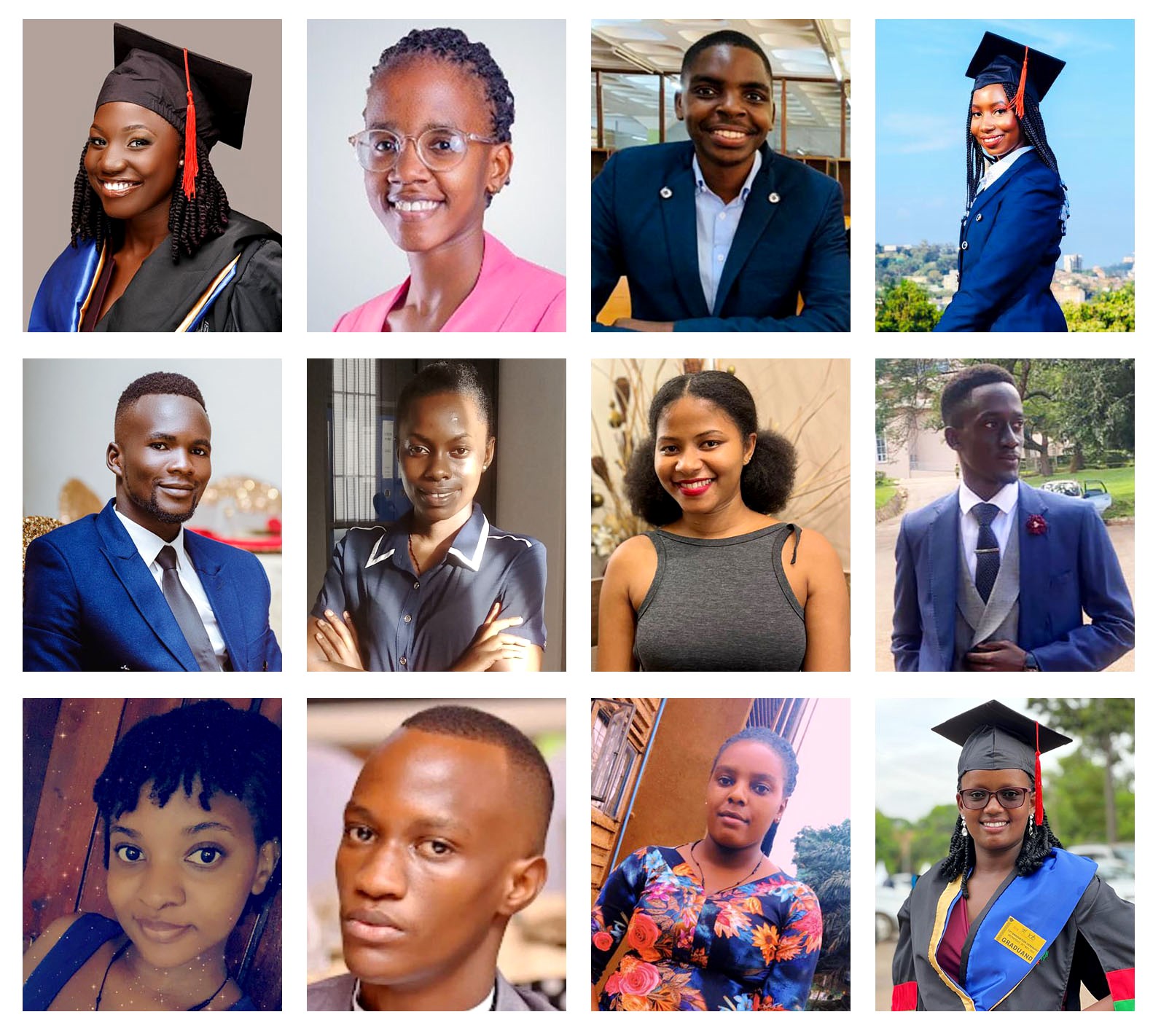
Mirembe Joy Ssenfuma
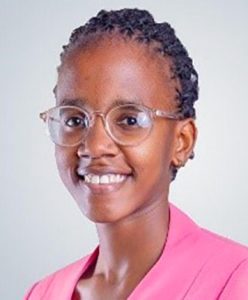
My name is Mirembe Joy Ssenfuma, I have pursed a Bachelor of Science in Quantitative Economics from Makerere University and today I graduate with a First-class Honors degree.
This journey has not been as easy as it may seem; strong winds blew, thunders and lightening came along the way, but the Almighty did not forsake me. I thank my mum for her continuous financial and emotional support, my siblings, and friends for the support during this academic journey. I was able to achieve this through group discussions, full attendance of lectures (I attended almost 99% of physical lectures) and lastly, I prayed every day for God to gift me with knowledge and wisdom through my journey. I thank the Lord for this success!
Taaka Proscovia
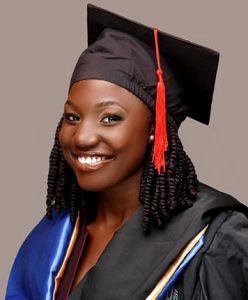
I started my campus journey in 2018 when by I joined Makerere University on government sponsorship with 18 points. I was admitted to study a Bachelors of Arts in Economics degree. I had always wished to join Makerere University amongst all the Ugandan high institutions of learning and when I was offered this scholarship it was a dream come true.
It was a blessing being given economics as a course because I had always had passion for it.
My campus journey hasn’t been an easy one, there have been up-hills and downhills but with the right attitude, good friends, my parents, my lecturers and God above all, I have come to the end of the journey graduating with first class honors. It is exciting, glorifying and honouring to graduate with a first class surely I should say because this experience is something I will never forget. To anyone out there who looks forward to excelling he or she needs to focus, have the right attitude and put in his/her best because those were my major attributes towards this achievement
Habaasa Darius
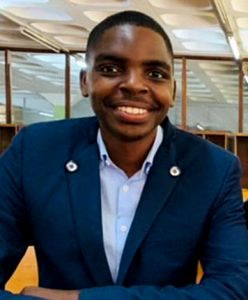
My name is HABAASA DARIUS and I have been pursuing a Bachelors of Arts in Economics degree from Makerere University where I am graduating with a first class degree with a CGPA of 4.70.
The reason I am graduating is because there are some people who held my hand at a point when my academic career seemed to have been aborted. My father refused to pay my school fees when I was in senior four and all hopes of ever completing my studies seemed to have been dashed.
A big appreciation goes to Mr Byamukama Remegio, the head teacher of St Mary’s College Rushoroza whom I shared my challenges with and he stood with me by allowing me to sit for UNEB before paying school fees since I could not afford it.
Thanks be to God who enabled me to get a scholarship from Cornerstone Leadership Academy which catered for my needs and school fees while in A’level where I even excelled at senior six with 19 points hence getting a government sponsorship.
It is on the basis of the above background that I always worked hard since I knew that academic excellence was one of the ways God would use to help me. I also did not want to disappoint those who were held my hand and invested their resources in me.
Makerere University was my dream campus and joining it was a dream come true for me which really motivated me further to work hard and realise my dreams. Campus life was not a walk over but I dedicated my life to reading my books and also serving God since I was even leading COBAMS fellowship in a bid not to ever disappoint God who made a way for me when there was no way.
Special thanks to my mother who never gave up on standing by my side despite not having money most of the times to support me financially and not forgetting Cornerstone Development Africa who sponsored my A’level and my lecturers at campus who constantly helped and advised me.
Paul Isingoma
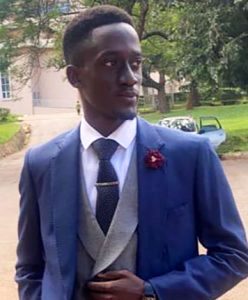
Paul Isingoma is an ambitious, warm-hearted go-getter. His devotion towards success and excellence inform his mindful but competitive approach. Paul is fueled by his passion for being a professional economist and auditor with outstanding advisory expertise for both financial institutions and world economies. He considers himself a ‘forever student,’ eager to both build on his academic foundations in Economics and stay in tune with the latest developments in the Global Economy through continued studying.
During his stay at Makerere University, Paul achieved a first class degrees for all the six semesters throughout the three years at campus. The toughest time of study was during the onset of the Covid-19 pandemic where there was limited interaction between lecturers and course-mates. Despite this, Paul devised newer means of staying in touch with his colleagues through online platforms and there was a strong determination towards being the best. The most interesting event at university was the election week for selection of new leaders. The spirit around campus was amazing and students used all kinds of strong vocabulary to win over the love of supporters.
Paul is forever indebted to the staff of School of Statistics and Planning for their unending effort and assistance towards his academic success. Ultimately, the achievement of such a great milestone has been possible due to the grace of God and Paul strongly remains grateful to the Almighty Lord for his undying love.
Karuhanga Kennedy
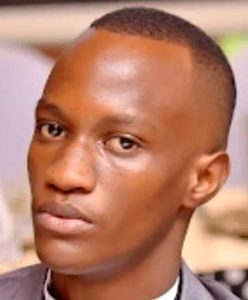
Bachelor of Science in Quantitative Economics
It’s true what they say that Makerere is the paragon of academic excellence in Uganda and to say that it never disappointed me would be an understatement. Here, one is in the hotpot of the “crème-de la -crème”. Nothing fails these students. I have found a distinct degree of ingenuity, hard work, determination and a combination of those plus all the others that I have not mentioned in this one place.
I believe that determination, commitment and a high degree of devotion should be the watchwords of anyone interested in making it at the prestigious hill. With the right mix of these, the right strategies are made as there’s no such thing as the “silver bullet” strategy to achieve one’s goal. Here, one’s flexibility plus grit matter a lot as these will enable one to even pass a course where they had a below average coursework mark.
Karuhanga wants to become a voice of authority within the economics and the finance fields. One could say the-go-to guy. This has and will push him to check every required box to achieve that. However, without piety, one cannot go far.
Helena Ahaisibwe Kaguma

Course: Bachelor of Arts in Economics
Journey at Makerere University
As the last born child of a widow who lost her husband a few months before I got enrolled into university, the journey was already predestined to be a trifle tumultuous as I pursued my education at Makerere University. However, by the grace of God, my hardworking mother and elder siblings, I didn’t lack. Like all other aspects of life, nothing has come on a silver platter. This entire journey entailed many sleepless nights, walking in the rain from home (I was a commuting student) for some papers and many other hardships a student faces, especially as a female student. However, I am very proud to say that all the hardships paid off and have shaped me into a better, stronger and more resilient individual. I officially joined Makerere University on Thursday, 9th August, 2018.
Inspiration to work hard
My mother has always been the inspiration behind my hard work. She has been a great mentor and role model, always pushing me to be the best version of myself.
How I was able to get a first class
In all honesty, all the credit for all my success belongs to God. However, with regards to my own efforts as a student to succeed in my academics, I attribute this milestone to prayer, discipline, determination and lastly proper time management.
My motivation
I have always been driven by my passion to be exceptional in all I do in order to be in the best position to make a positive impact on the lives of those less fortunate than me and to also make this world a better place for those who come after me.
Okwaimungu Jasper Ngira
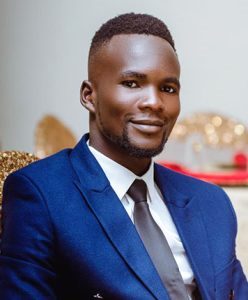
I am an Alur from Pakwach District and now a first class graduate of a Bachelor’s Degree of Arts in Development Economics. I am passionate about things to do with the economy and livelihood improvement. Sports and networking are my hobbies.
I draw my motivation from within. I have had a clear path of where I want to be in the medium and long term and how I am going to get there. From day one I knew I had to read hard to achieve my dreams.
My family background has also been a push factor. I have only been able to attain this degree because of government sponsorship and also some private help. This made me focus all my energy on studies such that I can one day uplift our status financially.
Another big motivation has been the expectations that I carry on my shoulders from my family, lecturers, sponsor and friends. They have believed in me since day one and I knew I had to read hard to make them proud. I have very many people to thank for their help along my journey to academic success. First and foremost, most my paternal Aunt Mrs. Angonifua Jolly and her husband Mr. Onoba Charles who have parented me since I was I was a child. Mr . Bitature Patrick has been a pillar in my life and I can’t thank him enough. My lecturers spotted my brilliance and helped nurture it the more especially Prof. Bbaale Edward, Dr. Suzan Kavuma and Mr Fred Kasalirwe. My discussion group mates helped me a lot too, I want to thank them and also congratulate them for graduating. I would also like to study a Masters degree in Economic Policy and Planning if I can get a scholarship or sponsorship.
Amasha Patricia Sheilla
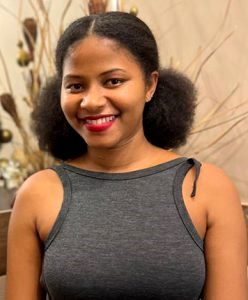
I am Amasha Patricia Sheilla, I pursued a Bachelor’s degree in Statistics at Makerere University.
I have always loved numbers and so that inspired me to take on a statistical course.
Staying focused, having and interacting with the right people has enabled me to get a first class degree (Cumulative Grade Point Average – CGPA = 4.41)
Nalweera Alice
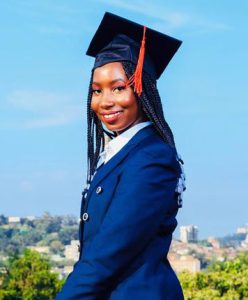
I am Nalweera Alice, a proud Muruli from Nakasongola District. I have a great passion for economics that is why I was inspired to undertake the course and it always gave me a push to focus and look forwards to a great performance.
My greatest inspiration has and will always be my father. He loves excellence in all aspects.
Going through Makerere University has been such a great experience for I adventured academically and socially.
Kapaska Evalyne
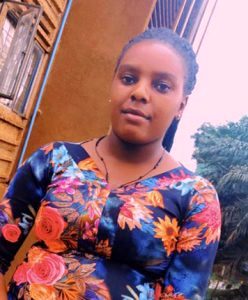
Today I graduate with a first class degree of Arts in Economics of Makerere University. I come from a small village in Ibanda District-western Uganda called Kyentaama. From there, I entered the gates of Makerere in August 2018 having attained 18 points from Citizen’s secondary school-Ibanda, which enabled me to get a merit government scholarship.
We stand today on the principle of the future, it is not a distant reality anymore, it begins here, it begins today. I entered Makerere as a child, but I am now leaving as an adult. Well, we did it, we all accomplished one of the major early milestones of our lives, university graduation. This is a major step in the journey of our lives, one that should be recognized for its immense significance. It is an act not only of personal commitment but also one of pride. We all worked hard to get to this day, and our work did not go to waste. Graduation is not an end goal in itself, it is instead a part of longer journey of life. I am glad and I thank God that He enabled me to get a first class degree.
When I was in my O’level, I was motivated by my elder sister and brother who were at Makerere university pursuing Bachelor of Arts in Economics and Bachelor of Arts in Education respectively. I loved studies and I worked and read very hard to also get to university, more importantly Makerere University. When I did my A’level, I worked very hard to be admitted on government which please my father. I promised him that I would get a first class degree, unfortunately, he died last year July and he has not been able to witness this day. (MHSRIP)
While at Makerere university, I chose good friends who could encourage me and advise me to attend all lectures from year one, and also consult on relevant course units for next semester even before it started. With the help of my OGs, OBs and the friends whom I made, we formed a discussion group where we could help each other in all course units. Truly, discussion groups, consultation with lecturers and students who were ahead of me for example Coleb Arinda last year first class graduand from Arts in Development Economics, and extensive reading were great factors that contributed to the success we are celebrating today.
While in my 3rd year first semester, my beloved dad passed away, I lost courage and thought that I was going to lose my first class but I kept praying to God to give me courage. My father always encouraged me to read hard so that I could get a first class. When I received my results of third year first semester, I had GPA of 4.16 which wasn’t a first class. I never gave up, continued reading and praying, God heard my prayers in the second semester and am graduating with a CGPA of 4.53.
I pray and hope that this gives me a brighter future that will help me achieve my career and life dreams.
For God and my country.
We build for the future.
Lillian Ahumuza
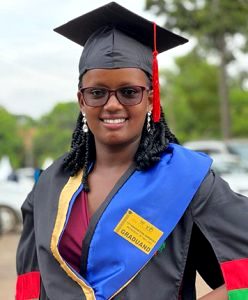
I am Ahumuza Lillian. I did Bachelor of Statistics and got a first class degree. What kept me moving in School was the idea that i always wanted to challenge myself to do better. I didnt get the 20 points i desired at A level and i promised myself to do better at University. My lecturer Dr. Dennis Wokiyi constantly encouraged me to work hard and he believed in me. I read very hard and my discussion group was always there for me. We shared ideas and researched on many topics. This first class is a result of hardwork, perseverance and consistency
You may like
-


Celebrating Academic Excellence: CoBAMS Presents 975 Graduands at Mak 76th Graduation Ceremony
-


Mak 76th Graduation Ceremony: CoNAS Presents 16 PhDs & Best Performing Male Student in the Sciences
-


CAES Presents Overall Best Performing Student in the Sciences & a Record 28 PhDs at the 76th Graduation Ceremony
-
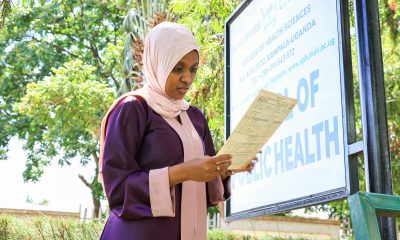

MakSPH Environmental Health Graduates Trained to Prevent Disease at Its Source
-


Philliph Acaye and the Making of Uganda’s Environmental Health Workforce
-


76th Graduation Highlights
Business & Management
Celebrating Academic Excellence: CoBAMS Presents 975 Graduands at Mak 76th Graduation Ceremony
Published
1 day agoon
February 26, 2026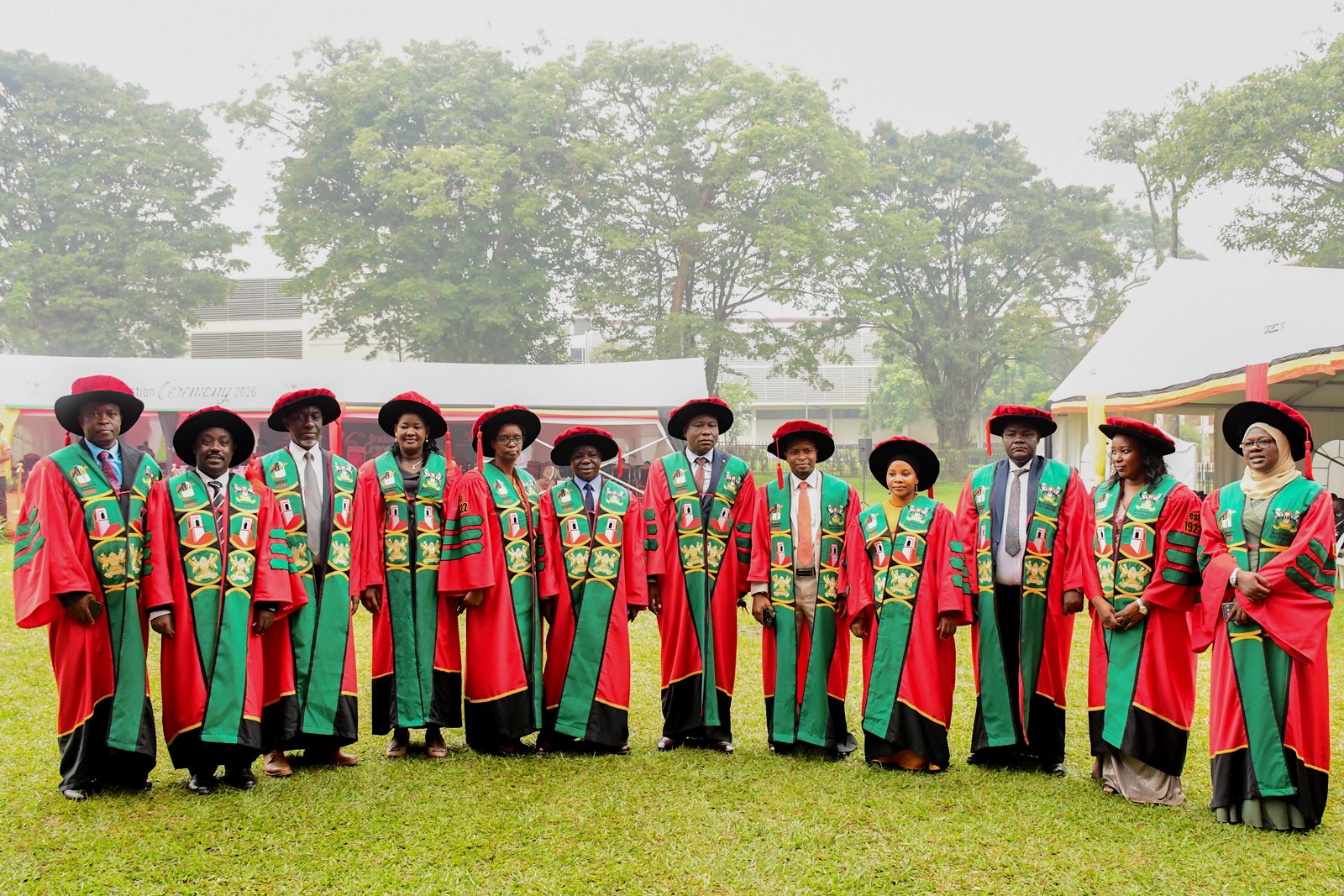
26th February 2026– The third day of Makerere University’s 76th Graduation Ceremony, held on 26th February 2026, underscored the University’s central role in shaping economic thought, business leadership, and public policy in Uganda and beyond. On this day, the College of Business and Management Sciences (CoBAMS) together with Makerere University Business School (MUBS) presented their graduands for the conferment of degrees and award of diplomas.
CoBAMS Graduation Statistics
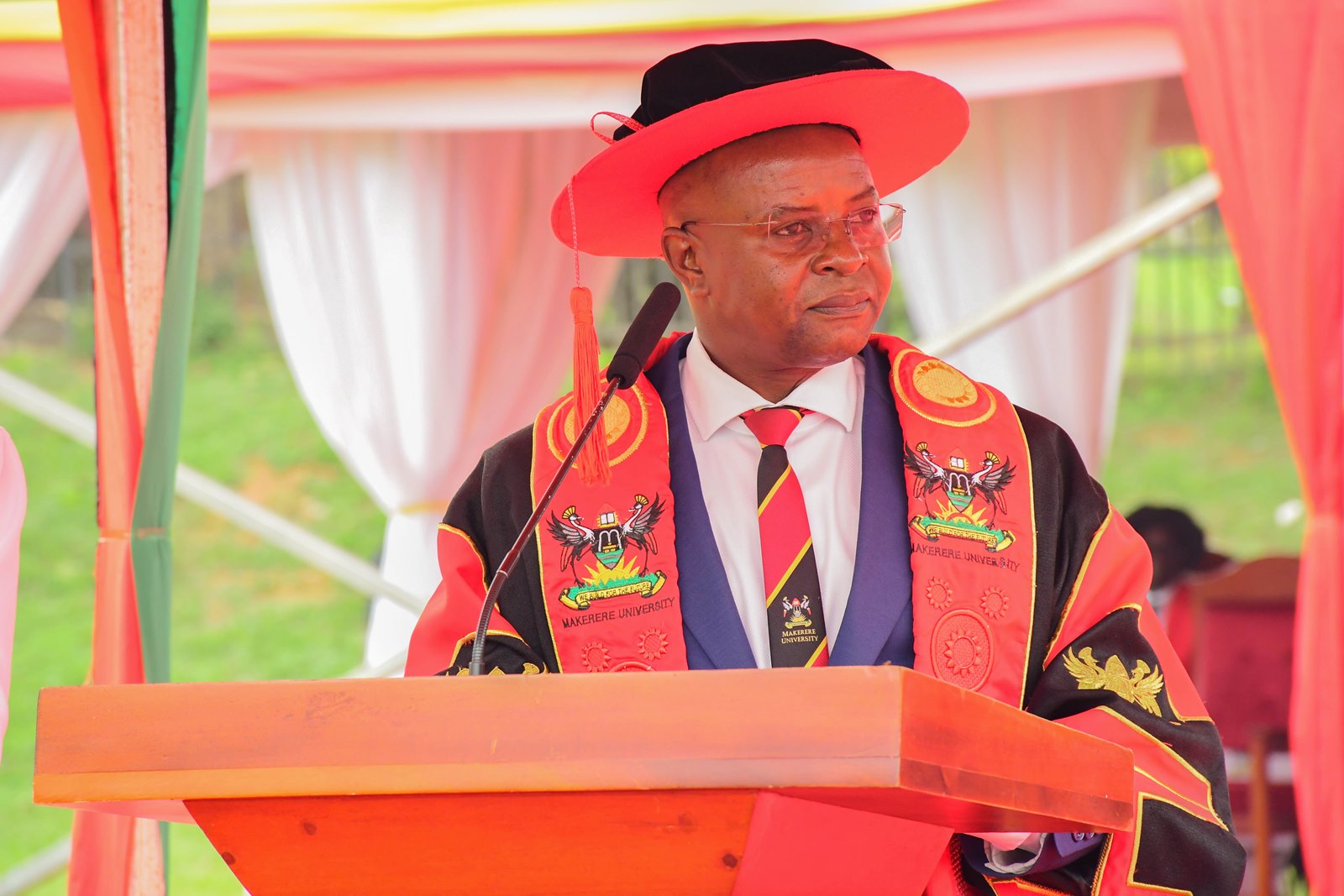
Across the University, a total of 9,295 graduands will be presented during the 76th graduation ceremony (24th to 27th February 2026). The College of Business and Management Sciences presented 975 graduands, comprising 14 Doctor of Philosophy (PhD) degrees, 334 Master’s degrees, 2 Postgraduate Diplomas, and 625 Bachelor’s degrees. This robust academic profile reflects the College’s sustained investment in advanced research, graduate training, and industry-relevant programmes designed to equip graduates with analytical competence, ethical grounding, and leadership capacity required to contribute meaningfully to economic transformation, institutional development, and enterprise growth at national, regional, and global levels.
Prof. Nawangwe emphasized that CoBAMS remains a key pillar in advancing the University’s research agenda. Through strategic partnerships with government ministries, the business community, and the private sector, the College has produced over 60 high-quality research outputs under the CoBAMS Working Paper Series, many of which have been published in internationally recognized peer-reviewed journals. These outputs he said are aligned with the UN Sustainable Development Goals (SDGs), Uganda’s 10-fold National Economic Growth Strategy, and the University’s Strategic Plan, reinforcing CoBAMS’ role in driving evidence-based development.
The Vice Chancellor commended the College for its five dynamic research centres—Entrepreneurship and Innovation; Statistics and Demography; Public Investment Management; the Environment for Development Initiative; and the Centre of Excellence for Africa Climate-Sensitive Macroeconomic Modelling—which collectively form the backbone of the College’s research enterprise. Through these centres, he noted CoBAMS continues to advance high-level scholarship, foster interdisciplinary collaboration, and deepen policy engagement, firmly positioning itself at the forefront of national and regional economic discourse.
In his message to the graduands, Prof. Nawangwe tasked them to become job creators, who are ready to turn challenges into opportunities. He encouraged them to remain proud ambassadors of Makerere University, upholding integrity and excellence, and to utilize their knowledge to transform communities and nations.
“You are all graduating with disciplines that are needed by society. We have equipped you with the knowledge and skills that will make you employable or create your own businesses and employ others. Do not despair. If you cannot find employment, reflect on the immense opportunities around you and raise to the occasion as an entrepreneur,” Prof. Nawangwe stated.
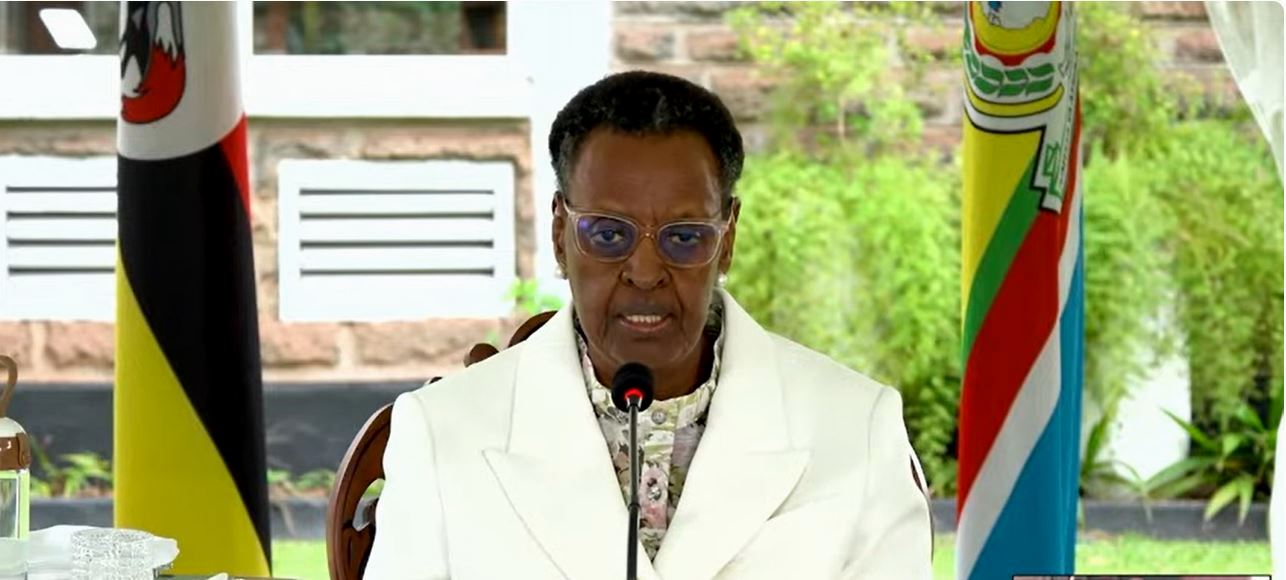
Addressing the congregation, the Guest of Honour, Hon. Janet Kataaha Museveni, First Lady and Minister of Education and Sports commended Makerere University for its pivotal role in transforming lives and shaping Uganda’s future. She congratulated the graduands upon reaching a significant academic milestone and reflected on the broader purpose of higher education in developing both knowledge and character.
She highlighted the success of the Emerging Leaders Programme, launched at Makerere University as a deliberate initiative to cultivate a generation of leaders grounded in values, integrity, and service. Founded on the conviction that higher education must shape both mind and character, the programme equips young people to navigate real-world challenges. She noted that 20 graduates from the inaugural cohort of the Emerging Leaders Programme were being celebrated at the 76th graduation.
“We recognised that our young people face real challenges such as moral decay, violence, addiction, exploitation and sometimes a loss of purpose and direction. The Emerging Leaders Programme was a deliberate commitment to raise a generation of leaders grounded in values, integrity and service to others. Today, 20 graduates represent the early visible fruit of that vision. They have deliberately chosen to build their lives on a foundation of strong moral values and servant leadership,” the Minister said.
The Minister urged graduands to view their achievements not as an end, but as a commissioning. She called upon them to lead with courage, humility, and responsibility, emphasizing that the world needs graduates who embody not just skills and knowledge, but character, integrity, and service. She reminded graduates that as they step into society, they carry the promise of a new Uganda, one where talent, ambition, and knowledge are matched by integrity, purpose, and service,” she exhorted, celebrating the role of higher education in nurturing both excellence and character.
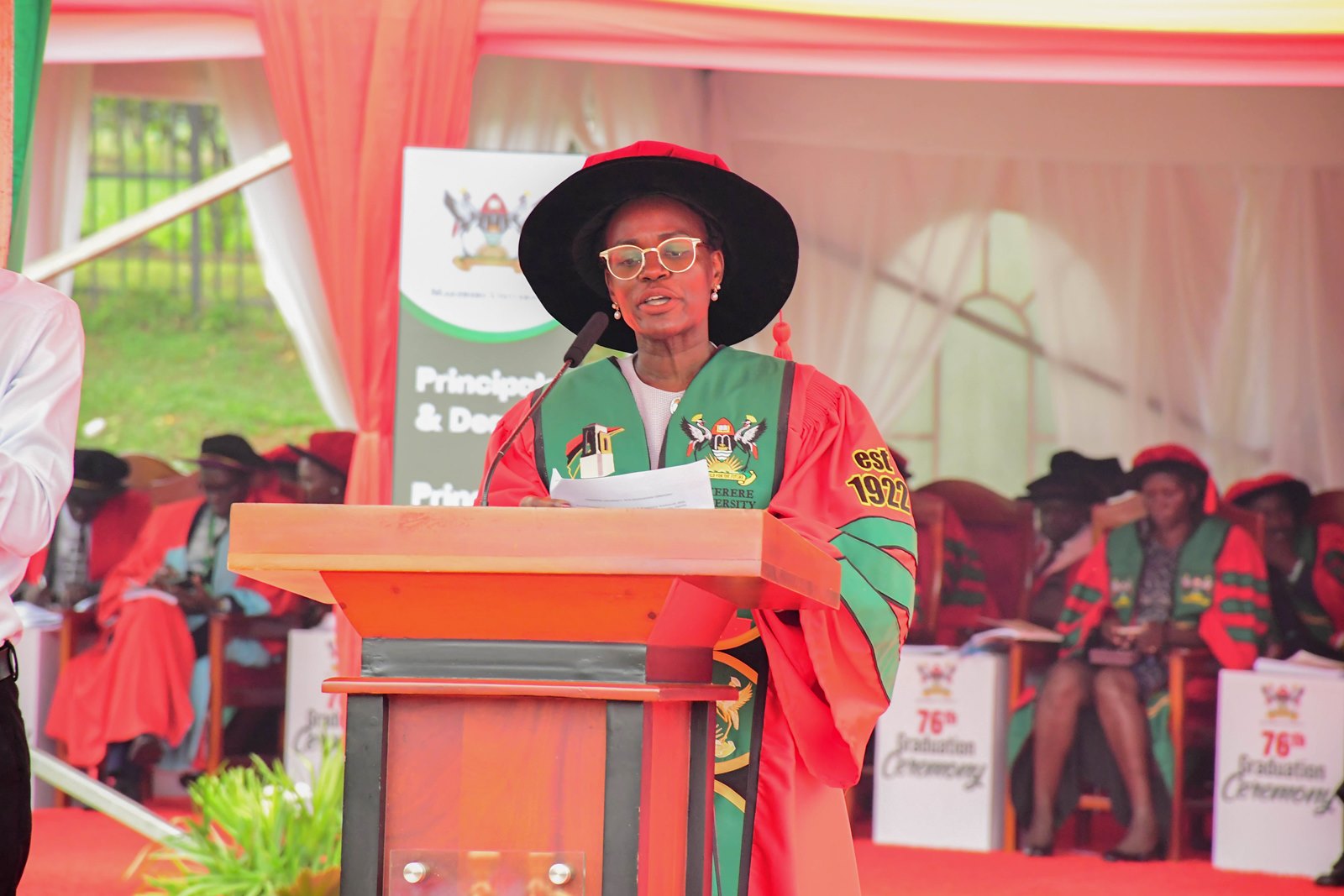
Delivering the commencement address, Dr. Patricia Ojangole, Managing Director of Uganda Development Bank and a proud Makerere University alumnus, lauded the University for equipping graduates with a strong intellectual foundation and the confidence to navigate the complexities of the modern world. She recognized the sacrifices of parents, guardians, and relatives, noting that behind every graduand lies a story of perseverance, encouragement, and unwavering support.
Dr. Ojangole urged the graduands to look beyond traditional employment, highlighting the vast opportunities for entrepreneurship and innovation in today’s digitally connected and globally integrated Uganda. She reminded them that the skills, exposure, and knowledge they possess, position them to create solutions, build enterprises, and drive economic and social transformation.
She emphasized lifelong learning, adaptability, and the cultivation of emotional intelligence and leadership as essential tools for sustained success, noting that the most effective leaders inspire and empower others. Above all, she urged the graduates to guard their integrity, develop strong networks, and remain resilient in the face of setbacks, framing every challenge as an opportunity to strengthen character.
“Learning does not end with this degree. The world of work is constantly evolving—technology advances, markets shift, and customer needs change. Those who stop learning quickly fall behind. Graduates must develop skills in artificial intelligence, data literacy, analytical thinking, forecasting, and strategic planning, while also cultivating emotional intelligence and leadership. These abilities are essential in the 21st-century workplace, where people follow leaders who inspire. Lifelong learning, adaptability, curiosity, and a willingness to embrace change are no longer optional—they are the new currency of corporate and business success,” she submitted.
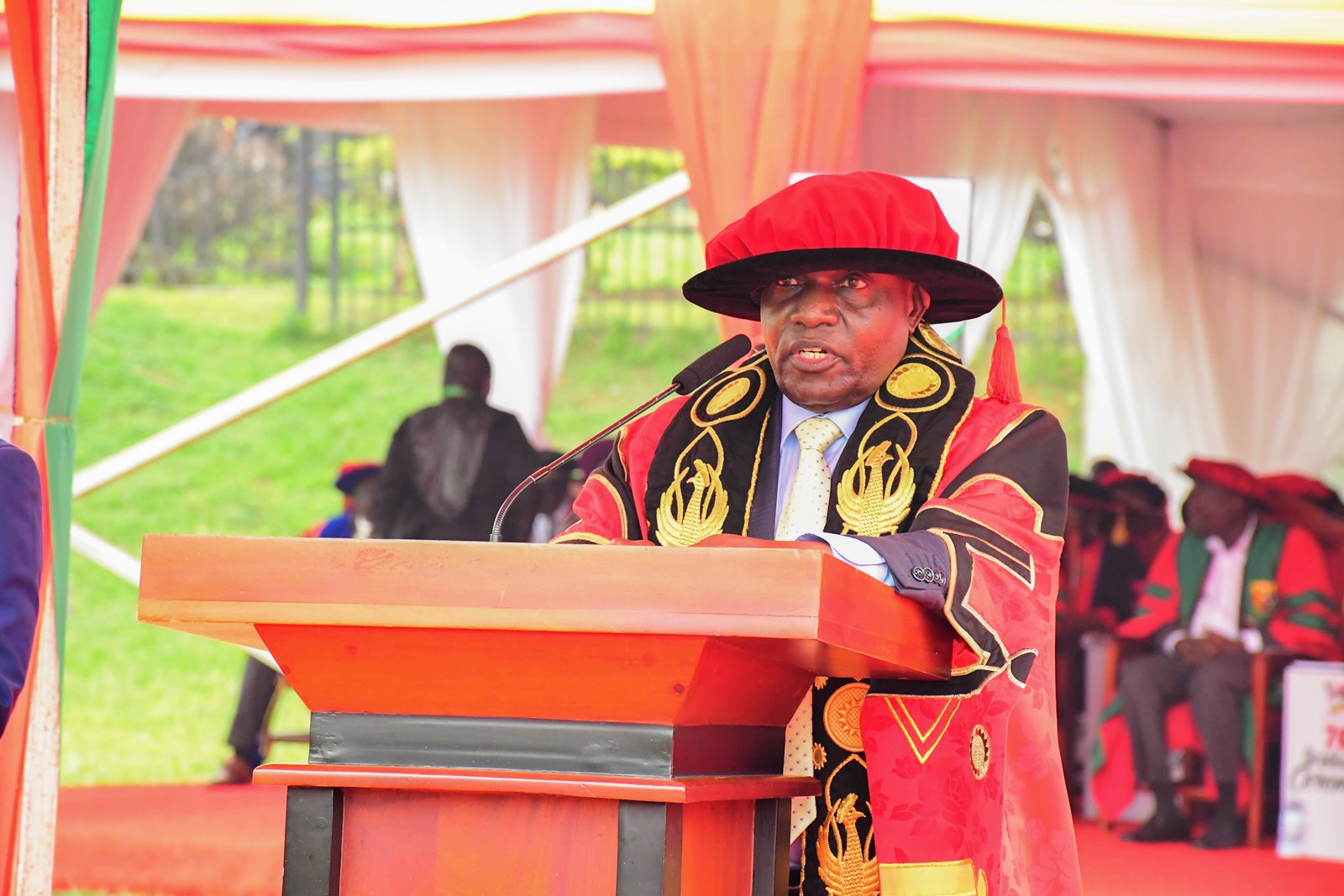
The Makerere University Chancellor, Dr. Crispus Kiyonga urged graduates to view their time at Makerere not only as an academic journey, but as an opportunity to engage with the world around them. He encouraged them to identify opportunities within their communities and the nation at large, highlighting that while some may secure government or private sector jobs, others will need to create their own paths through entrepreneurship.
“Beyond pursuing your courses, seize the opportunities at the university to broaden your knowledge of the world, your country, and the communities in which you live. Be attentive to the opportunities around you—those you can leverage to engage in meaningful and viable activities that bring prosperity,” the Chancellor advised.
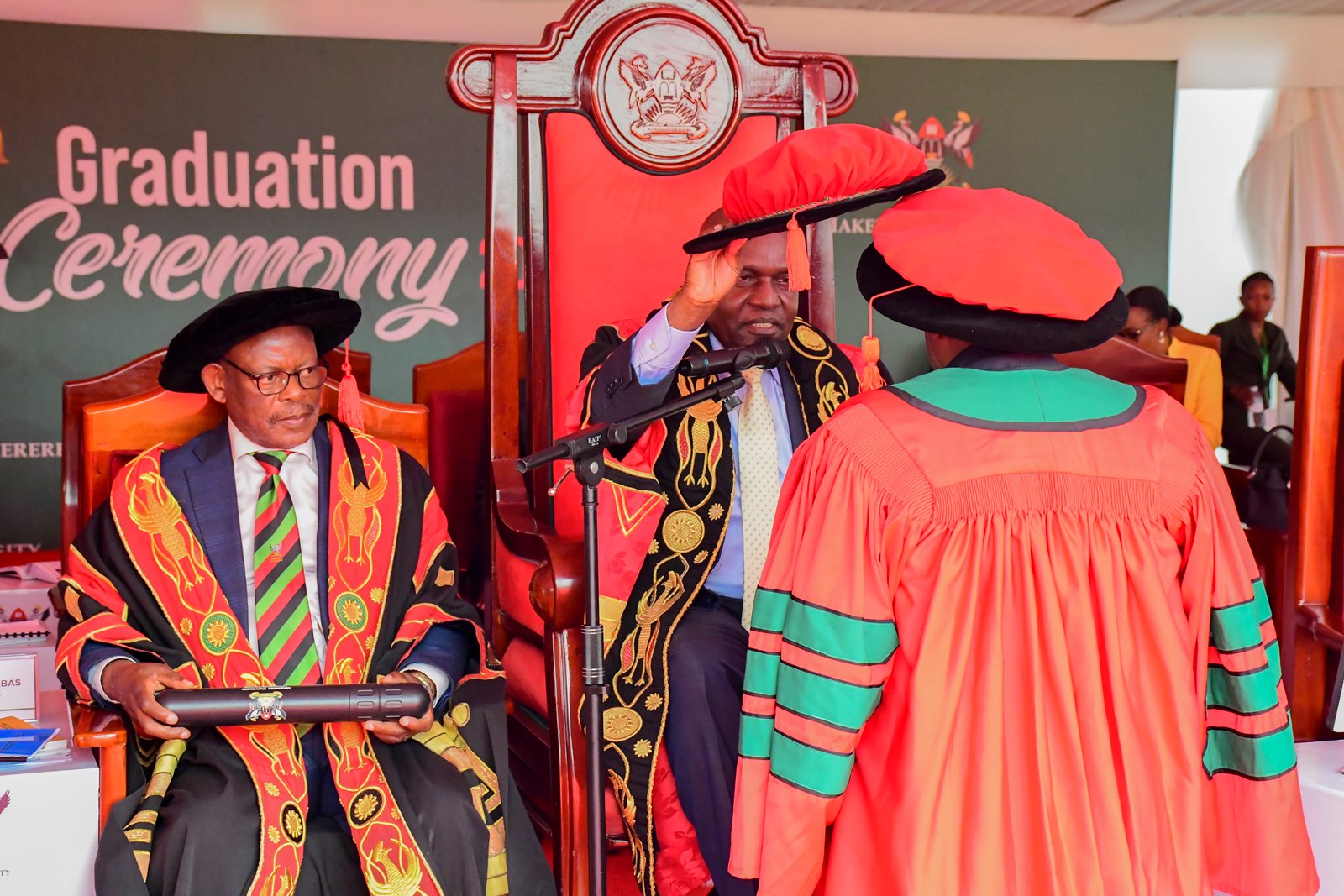
A key highlight of the day was the conferment of the Doctor of Letters (Honoris Causa), of Makerere University upon Dr. Japheth Buleetwa Katto, recognizing him as an Honorary Scholar of Makerere University. A distinguished professional with remarkable achievements, Dr. Katto has made significant contributions to Uganda, the East African region, and beyond, particularly in advancing the accountancy discipline and strengthening the capital markets industry. His work has played a transformative role in Uganda’s social and economic development while also influencing the accountancy profession on a global scale.
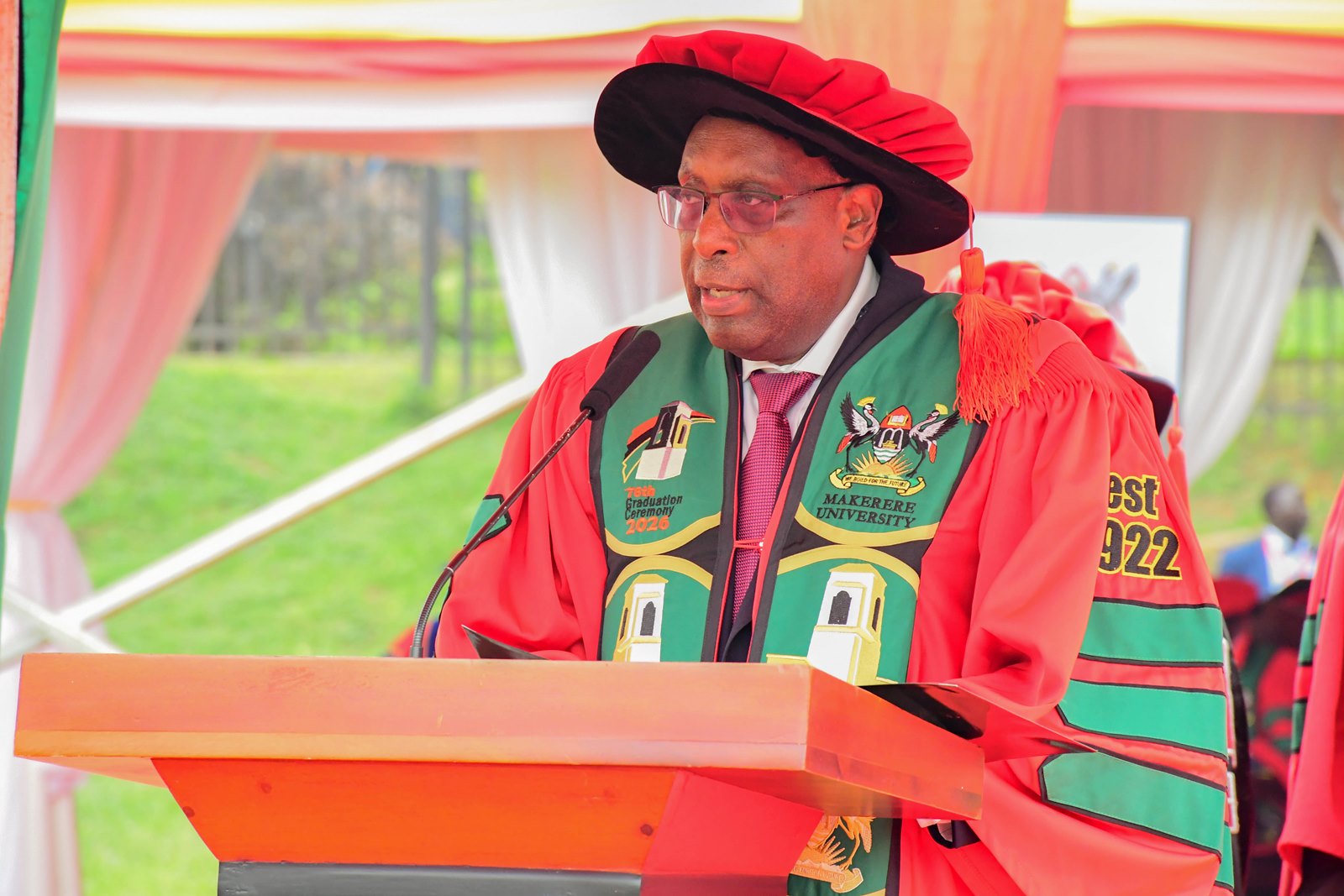
Accepting the Honorary Doctorate Doctorate, Mr. Japheth Buleetwa Katto expressed deep gratitude to Makerere University and those who supported his journey. Reflecting on fifty years in corporate governance and finance, he emphasized a key lesson: integrity, diligence, and ethical leadership are always noticed, and the rewards of sowing excellence will inevitably follow, even if it takes decades.
“This recognition comes as a surprise and brings with it an important lesson, I wish to share with everyone here: people are always watching. They notice when you choose integrity over shortcuts, when you champion good governance even when it is unpopular. They see not only the good, but also the bad and the ugly. We must never forget the eternal law of the harvest: we reap what we sow. If you sow excellence, diligence, and ethics, the harvest—though it may take decades—will always find you,” Dr. Katto said.
Addressing the graduands, Mr. Japheth Buleetwa Katto urged them to embrace the unexpected, recognize that integrity is their greatest strength, and harness the power of networking. He reflected on his own journey, crediting teachers, mentors, colleagues, and family for their support, and encouraged the new graduates to always strive to make a positive impact in everything they do.
Business & Management
Parliament, MoFPD and Makerere Launch Five-Day Training on Integrated Macroeconomic Modelling to Strengthen Fiscal Oversight
Published
2 days agoon
February 25, 2026By
Mak Editor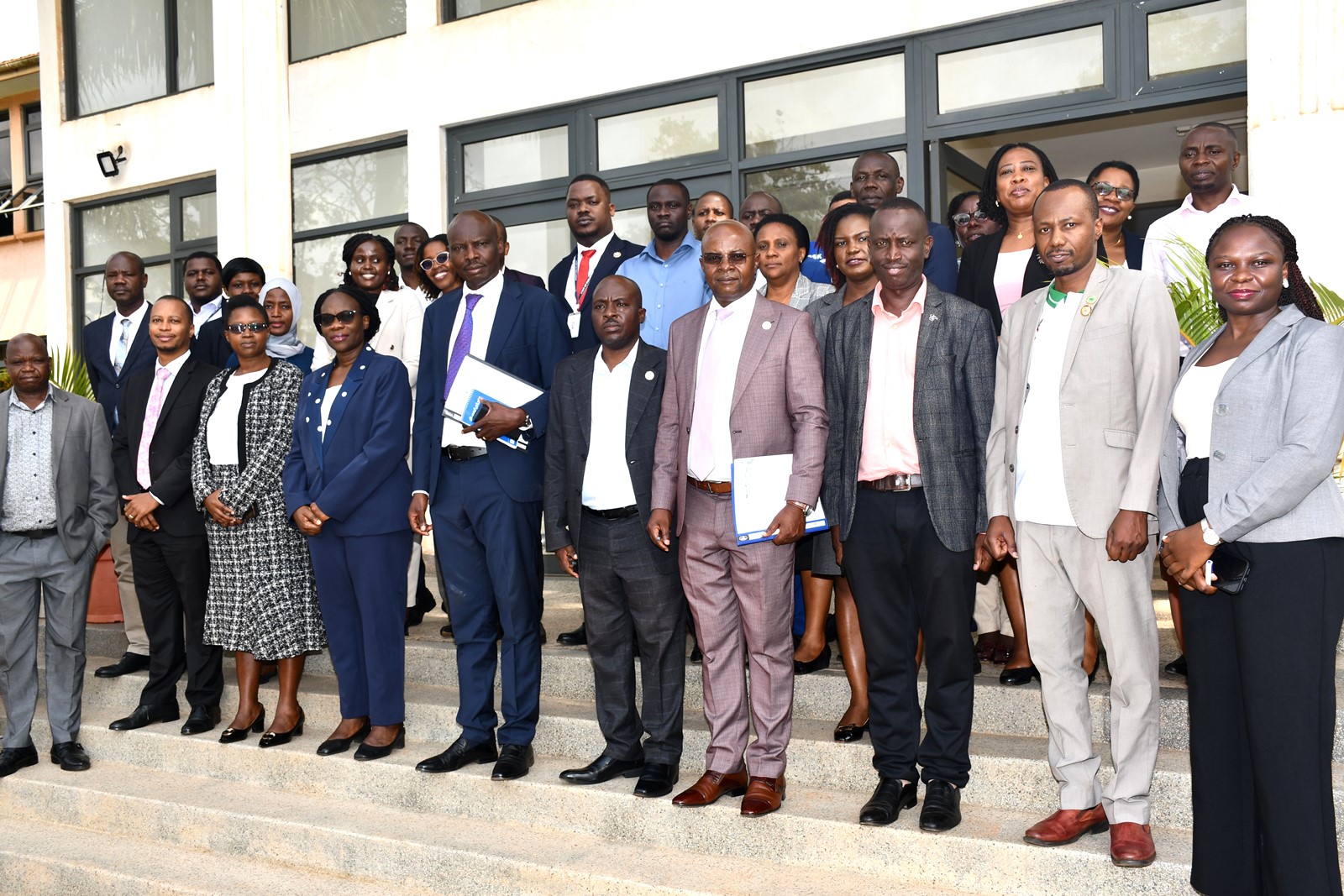
By Wilber Tumutegyereize
In a significant step toward strengthening fiscal governance and enhancing evidence-based decision-making, the Parliament of Uganda, in collaboration with the Ministry of Finance, Planning and Economic Development and Makerere University, has launched a five-day intensive training programme on Integrated Macroeconomic Modelling.
The training brings together staff of the Parliamentary Budget Office (PBO) for a comprehensive capacity-building programme designed to deepen their analytical expertise in assessing national budgets, evaluating fiscal policy options, and generating independent, data-driven advice for Members of Parliament. The initiative forms part of a broader institutional strategy to reinforce Parliament’s oversight role and ensure that national budgeting processes are aligned with Uganda’s development priorities as articulated in the National Development Plan and Parliament’s Strategic Plan.
Strengthening Evidence-Based Fiscal Oversight
Speaking at the opening session on behalf of the Manager of the Public Investment Management (PIM) Centre of Excellence at Makerere University, Dr. Peter Babyenda emphasized that the increasing complexity of Uganda’s fiscal environment demands stronger analytical capacity within Parliament.
“This training comes at a critical time when the demands on Parliament to undertake rigorous scrutiny of fiscal and economic policy have never been greater,” Dr. Babyenda stated.
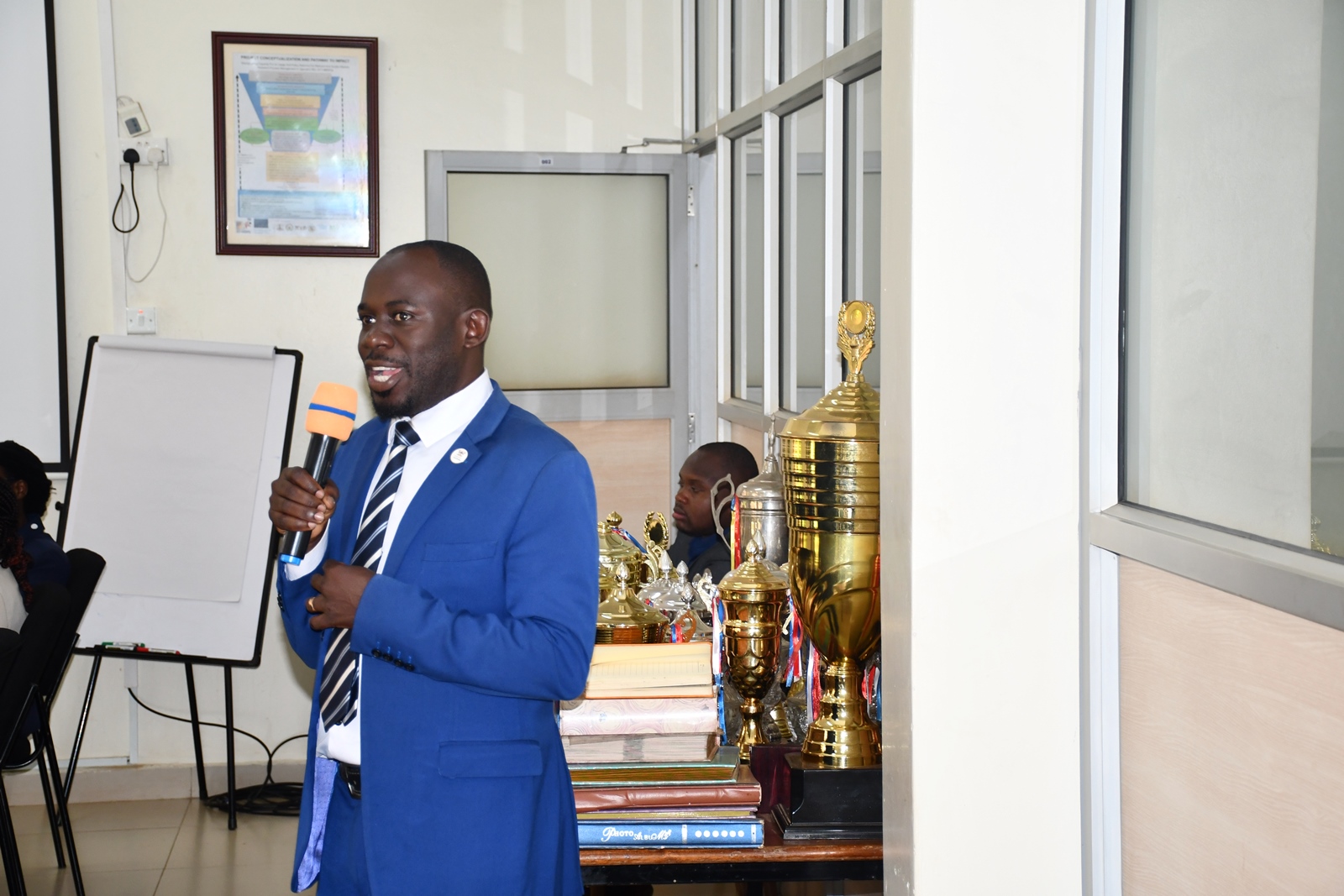
He noted that Parliament’s constitutional mandate—to legislate, appropriate public funds, and oversee government expenditure—requires objective, independent, and technically sound economic analysis. The Parliamentary Budget Office plays a central role in fulfilling this mandate by providing Members of Parliament with timely assessments of revenue projections, expenditure allocations, public debt sustainability, and macroeconomic trends.
Dr. Babyenda explained that the Government’s Integrated Macroeconomic Model provides a holistic framework for understanding the interconnections between economic growth, fiscal policy, public investment, inflation, debt dynamics, and household welfare. By incorporating this model into parliamentary analysis, the PBO will be better positioned to simulate alternative policy scenarios and assess their short- and long-term implications.
Institutional Priorities
Mr. Henry Waiswa, Deputy Clerk to Parliament in charge of Corporate Affairs, contextualized the training within Parliament’s broader institutional reform agenda. He underscored Parliament’s constitutional responsibility to legislate, allocate resources, and oversee the management of public finances.
“Since its establishment under the Budget Act and its anchoring under the Administration of Parliament Act, the Parliamentary Budget Office has become a cornerstone of evidence-based fiscal oversight,” Mr. Waiswa noted.
He observed that Uganda’s public financial management landscape has become increasingly complex, with evolving fiscal pressures, development financing needs, and global economic uncertainties. In such an environment, Parliament must not only examine headline budget figures but also anticipate the macroeconomic and distributional effects of policy decisions on households, businesses, and vulnerable communities.
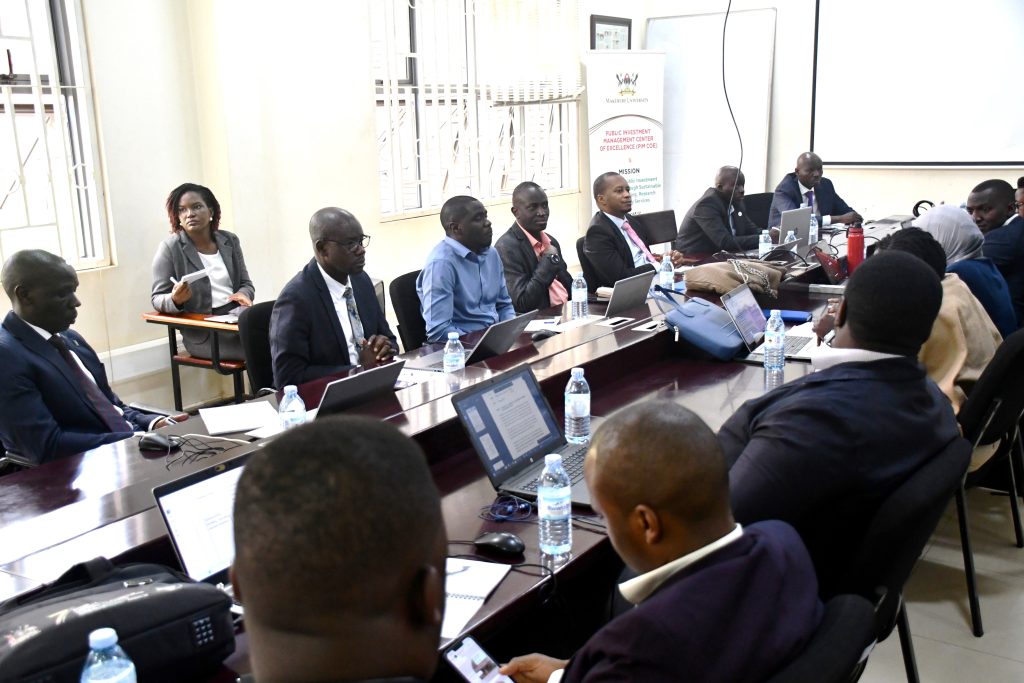
Mr. Waiswa further expressed appreciation to the Ministry of Finance, Makerere University, and the Resource Enhancement and Accountability Programme (REAP) for their technical and financial support in designing and facilitating the training.
Academic Expertise and Analytical Rigor
Professor Edward Bbaale, Director of the PIM Centre of Excellence at Makerere University, highlighted the critical role of academia in strengthening public sector institutions. He emphasized that collaboration between Parliament, the Ministry of Finance, and Makerere University reflects a shared commitment to improving the quality of fiscal governance.
“When our key public institutions work together, we enhance the credibility of economic management and ensure that policy decisions are informed by rigorous analysis,” Professor Bbaale said.
He explained that Integrated Macroeconomic Models combine key economic indicators, such as Gross Domestic Product (GDP), government revenue and expenditure, inflation, debt, investment, and external balances, into a unified analytical framework. These models enable analysts to conduct “what-if” simulations, test policy assumptions, and evaluate trade-offs between competing fiscal priorities.
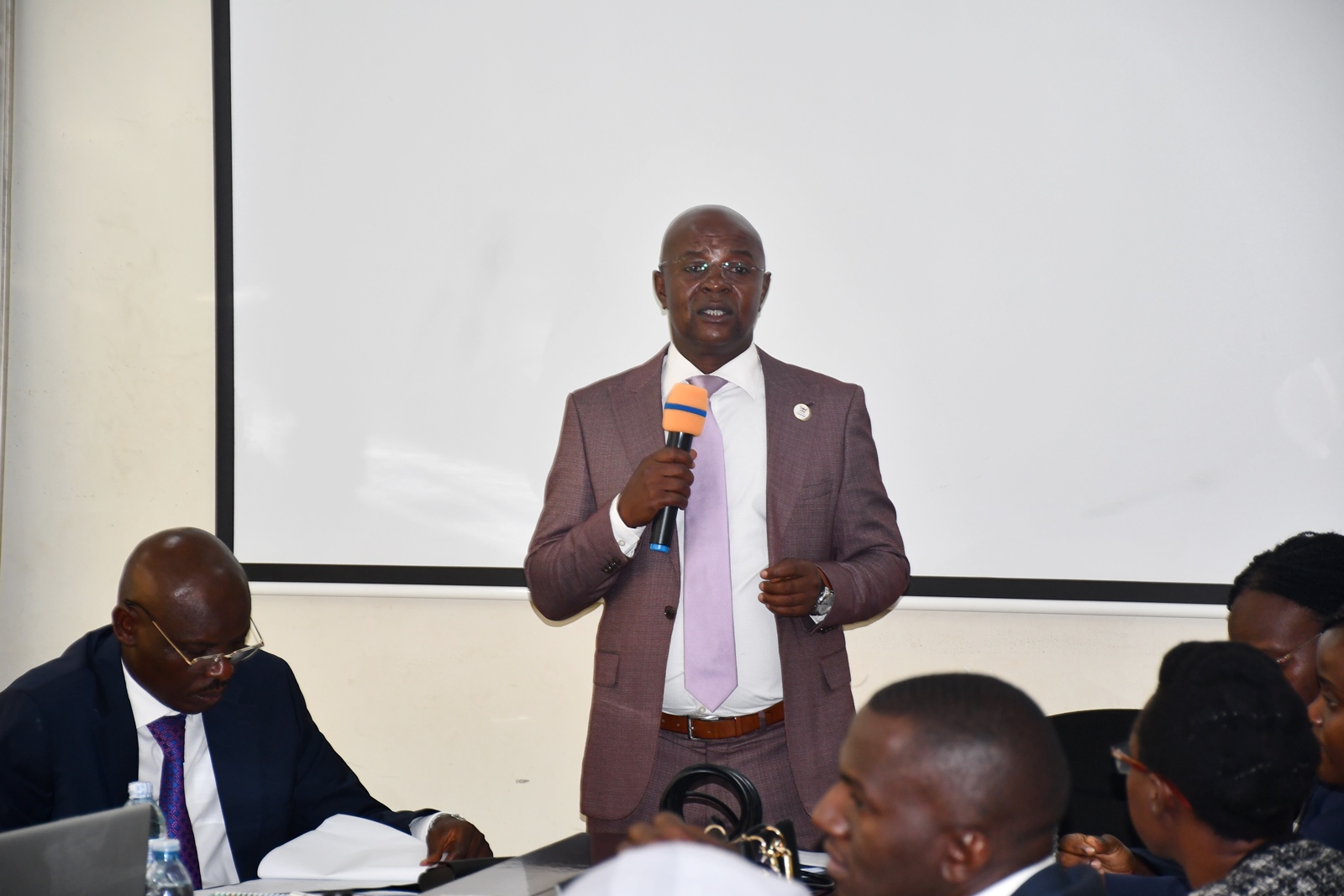
Professor Bbaale urged participants to fully utilize the five-day training to strengthen their technical proficiency and contribute meaningfully to Parliament’s oversight function.
Practical Application and Long-Term Impact
The training programme emphasizes hands-on learning, allowing participants to work directly with the Integrated Macroeconomic Model. Through practical exercises, PBO staff will learn how to:
- Simulate alternative fiscal and macroeconomic scenarios.
- Assess revenue and expenditure implications of policy proposals.
- Evaluate public debt sustainability and fiscal risks.
- Examine distributional impacts on poverty, inequality, and household welfare.
- Develop evidence-based policy briefs for Members of Parliament.
Dr. Babyenda reiterated that the value of the training lies in its practical application.
“The ultimate measure of success will be how effectively participants apply these tools to real parliamentary analysis,” he said. “It is through this application that Parliament can maintain rigorous oversight over public finances.”
A Strategic Investment in Institutional Capacity
By institutionalizing the use of Integrated Macroeconomic Modelling within the Parliamentary Budget Office, Uganda is making a strategic investment in sustainable institutional capacity. The initiative ensures that parliamentary analysts are trained using the same analytical frameworks applied in national fiscal planning, thereby reinforcing both technical quality and independence in budget scrutiny.
As Uganda navigates evolving economic challenges, the strengthened capacity of the PBO will enable Parliament to critically evaluate budget proposals, anticipate policy outcomes, and provide informed, transparent, and accountable oversight of public resources.
The five-day Integrated Macroeconomic Modelling training thus represents a pivotal milestone in advancing Uganda’s commitment to sound fiscal management, democratic governance, and evidence-based policymaking.
Business & Management
Climate variability found to shape malaria trends in Yumbe District
Published
1 week agoon
February 20, 2026
A new study led by scientists from Makerere University School of Public Health has demonstrated that short-term climate variability plays a significant role in malaria transmission in Yumbe District, West Nile sub-region of Uganda. The study, Climate variability and malaria incidence trends in Yumbe District, West Nile Sub-region of Uganda (2017–2021), by Lesley Rose Ninsiima, Rogers Musiitwa, Zaitune Nanyunja, James Muleme, Chris Maasaba, Twahiri Anule, and David Musoke, was published in February 2026 in Malaria Journal through Springer Nature Link.
Today, malaria remains a major public health burden in Uganda, where environmental conditions support sustained transmission. Despite persistent outbreaks in northern Uganda, limited local evidence exists on how the changing climate patterns influence malaria trends. This study addressed that gap by examining five years of malaria surveillance data alongside district-level rainfall and temperature records.

Using routine health facility reports from the District Health Information System (DHIS) and climate data from the Uganda National Meteorological Authority (UNMA), the researchers applied time-series analysis to assess seasonal patterns and delayed climate effects on malaria incidence. Between 2017 and 2021, Yumbe District recorded 2,066,711 malaria cases, with transmission showing clear seasonal peaks between May and July and September and November, aligning with rainy periods.
Their analysis showed that rainfall was the strongest climatic driver of malaria transmission. Increased rainfall was associated with higher malaria cases approximately one month later, reflecting the time needed for mosquito breeding and transmission cycles. In contrast, higher minimum temperatures were linked to reduced malaria incidence, while maximum temperature showed no significant effect. Together, rainfall and minimum temperature explained a substantial proportion of variation in malaria cases, highlighting malaria’s sensitivity to short-term climate fluctuations.
The study findings underscore the value of integrating climate information into malaria surveillance and early warning systems to anticipate transmission peaks and guide timely interventions. Strengthening collaboration between public health and meteorological sectors, the researchers argue, could improve preparedness and support climate-informed malaria control strategies in high-burden settings.
Further details: https://link.springer.com/article/10.1186/s12936-026-05824-0
Trending
-

 Humanities & Social Sciences5 days ago
Humanities & Social Sciences5 days agoMeet Najjuka Whitney, The Girl Who Missed Law and Found Her Voice
-

 Health1 week ago
Health1 week agoUganda has until 2030 to end Open Defecation as Ntaro’s PhD Examines Kabale’s Progress
-

 Agriculture & Environment1 week ago
Agriculture & Environment1 week agoUganda Martyrs Namugongo Students Turn Organic Waste into Soap in an Innovative School Project on Sustainable Waste Management
-

 General4 days ago
General4 days ago76th Graduation Highlights
-

 General1 week ago
General1 week agoMastercard Foundation Scholars embrace and honour their rich cultural diversity
